You want to build something really cool with AI. You have the best idea and the right skills to bring your idea to life. But you still don’t know which API platform to build on and with which tools. There is a new one in the market almost every week, and it’s so easy to get confused and lost in a pile of options. You need to take into account the models they use, the pricing they have, the speed, and so much more.
In this article, we break down some of the best options in the market right now and what makes them stand out. This will not give you one answer on what the best API platform is, but it will at least give you an idea of what to consider and why. Let’s start!
Here are some of the most reliable and effective platforms that developers building with AI may need in their work processes. We’ve divided them into two main categories: API marketplaces and foundational API platforms.
The three platforms below are API marketplaces that come with ready-to-use utilities and tools.
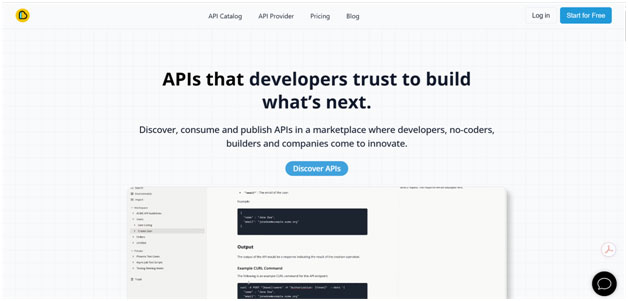
ApyHub provides APIs that offer a wide range of functions and software utilities. Instead of large enterprise bundles, they offer micro-level functionalities such as data validation, image compression, file conversions, and more.
AI Integration with Almost No Effort: Instead of building complex AI tools yourself, you can just plug in ApyHub’s ready-to-use APIs.
Developer Resources: Complete documentation, an interactive API playground, and quick-start tools.
Single API Key for Multiple APIs and Faster Launches: Their APIs are plug-and-play and let you get your product to market much quicker.
A Large Number of APIs: Over 150 APIs (and growing) in one place. Strong focus on AI based APIs.
Strong Encryption: They provide high-level encryption to keep your data in safe and reliable hands.
Simple API Management: With ApyHub, you can keep track of everything, like usage, performance, and costs, from a single, easy-to-use dashboard.
Dynamic Pricing: It ensures a dynamic pricing model for AI and utility APIs. It also provides a unified subscription across all APIs.
Good Option for Devs: It’s a favorite option among developers who are looking for predictable costs.
Based in the EU, fully GDPR compliant.
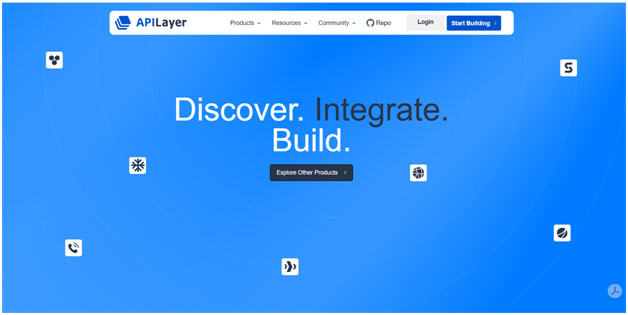
APILayer is another popular option that provides a large number of APIs for different needs and purposes.
Easy Integration: APILayer emphasizes a developer-friendly experience and provides APIs that are feature-rich and natively integrated.
Rich Marketplace: The marketplace contains more than 64 distinct APIs.
Many Categories: It includes a dedicated small AI/ML category with 4 APIs and larger categories like 58 Dev APIs, 27 Marketing APIs, and 14 Geolocation APIs.
Specialized APIs: The platform features the IPstack API, which provides IP geolocation data. Other important APIs include Serpstack for SERP, Currencylayer for currency, and Pdflayer for PDFs.
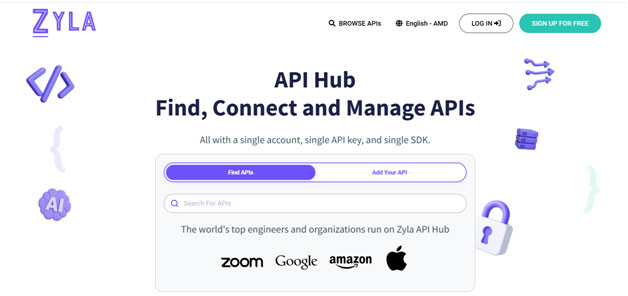
Zyla’s main focus is monetization for providers. It has many niche APIs in text analytics, social media metrics, and financial data.
Unified API Access: Zyla allows you to “Find, Connect, and Manage APIs” with a single account, a single API key, and a single SDK. This means you don’t need to manage multiple credentials and integrations when you build applications that rely on several different API services.
Dedicated AI & ML Categories: The marketplace is organized into dozens of categories, including AI & Machine Learning, Natural Language Processing (e.g., Bad Words Censure API), Visual Recognition & Imaging (e.g., Photo Labeling API), and Voice & Speech Technology.
Easy-to-Follow Metrics: For each API, the hub publicly displays performance data like Service Level (SLA) and average Response Time measured in milliseconds.
Multi-Language SDKs: To accelerate development, Zyla provides SDKs for popular programming languages, including Python, Node.js, and PHP.
Developer-Centric Features: The platform includes tools for API Monitoring from a central dashboard.
Some big names for building custom AI applications include Google Cloud AI APIs, Hugging Face, OpenAI, Anthropic, and others. In this article, we cover two of them.
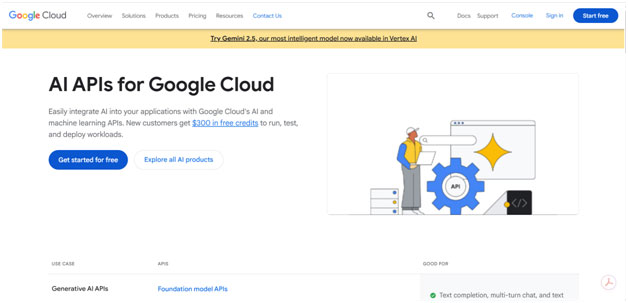
Google Cloud gives you many AI APIs so you can plug them straight into your apps.
Generative AI: Tools like Gemini can help you write text, generate code, have a realistic conversation, or even create images from thin air with Imagen.
Build Your Own Model: Vertex AI is your one-stop shop for building, training, and launching your own custom machine learning models, even if you’re not really that good at data science.
The Specialists: With Google Cloud AI APIs, you can figure out what’s in a picture, get accurate live transcriptions from audio, or translate languages.
Smarter Chatbots: If you want to build a chatbot that doesn’t sound like a robot, you can use this platform to create natural conversations for your website or app.
Paperwork Killer: If you’re tired of dealing with piles of PDFs and forms, their AI can read, understand, and pull the important data out of them for you.
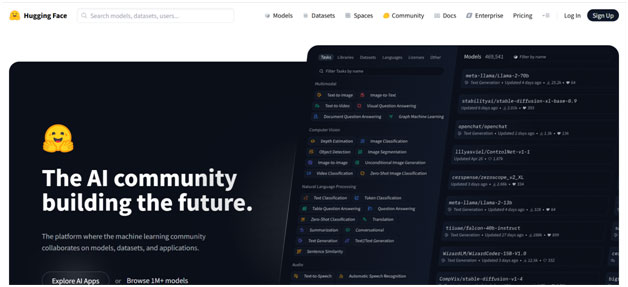
Think of Hugging Face less like a single API and more like a “GitHub for AI.”
One-Stop Shop Hub: It’s a huge public library where you can find and download thousands of pre-trained models, datasets to train them on, and even demo apps (called “Spaces”).
Several AI Models: Through their API, you don’t just get one company’s models. You get access to models from a ton of different providers like Cohere, Fireworks, and Groq.
Open-Source Tools: Libraries like Transformers, Diffusers, and PEFT are great for developers who want to download a model and either run it themselves or fine-tune it for a specific job.
“Spaces”: You can build a quick, interactive web demo for your cool ideas using “Spaces.” It’s a super easy way to host a portfolio of your AI projects and let anyone in the world try them out.
So, what’s next? Whether you have already decided on a platform based on this list or not, there is something you absolutely should stay away from: getting stuck in “analysis paralysis.” Read some reviews, sign up for a free trial if you can, but ensure to eventually pick one.
Pick whatever API platform best fits your current budget and feels the most suitable for the project you’re excited about right now. Thankfully, your first choice doesn’t have to be your last. Just get building, see what works, and don’t be afraid to switch later if a better tool comes along.
What matters most is that you start.
Discover our other works at the following sites:
© 2026 Danetsoft. Powered by HTMLy